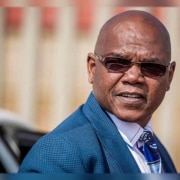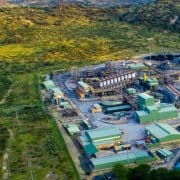|
Getting your Trinity Audio player ready...
|
By Oliver Bullough
First published on Al Jazeera
More than a trillion dollars are stolen from the world’s poorest countries every year, which is such a vast sum that it is hard to visualise. That amount of money would get you Apple, with enough left over to buy every sterling-denominated note or coin in circulation.
To count out a trillion dollars in dollar bills would take you almost 32 000 years. If the first anatomically modern humans had started counting at the moment they crossed from the Middle East into Europe, they would be getting to a trillion around now.
But if you live in a wealthy country, you may be struggling to care.
After all, most of that money ends up supporting jobs in estate agencies, buoying the share prices of luxury goods companies, and taking our politicians on all-expenses-paid trips to Baku, Bahrain, or Bamako.
Although corruption is bad for other people, it suits us very well, right?
Wrong. Corruption is everyone’s problem, and here are four reasons why you should care about the world’s failure to properly address the situation.
Corruption causes bloodshed
We should be cautious about accepting the word of armed groups who call governments corrupt. They are murderous and will say anything to attract more followers.
But we do need to listen to the warnings of our own generals. All around the world, the people who know best what it is like to fight terrorism tell us their worst enemy is corruption.
“For too long, we’ve focused our attention on the Taliban as the existential threat to Afghanistan. They are an annoyance compared to the scope and magnitude of corruption,” said US Marine Corps General John Allen, formerly head of international forces in Afghanistan, in 2014.
Similar warnings can be heard about Boko Haram in Nigeria, the Islamic State of Iraq and the Levant (ISIL, also known as ISIS) in the Middle East, and equivalent movements elsewhere.
Corruption angers citizens, making them sympathetic to the state’s enemies, even if they are terrorists, while undermining the government’s ability to fight back. In the long term, the best way to neuter the threat of terrorism is to provide honest and fair government.
This is everyone’s problem because terrorism spreads freely across national boundaries – a movement born in Iraq can attack us in Manchester, Paris or Brussels.
Corruption spreads disease
In 2017, Russia recorded more than 100 000 new HIV infections for the second year running, taking the total number of cases in the country perhaps as high as 1.5-million.
Two percent of Russians in their thirties are infected, which is unprecedented for a European country, and the epidemic’s growth shows no sign of slowing. It is spread by drug use, prostitution, and a poor healthcare system – all of which are a result of the country’s rampant corruption.
Russia is not alone. Corruption has helped rekindle polio in Ukraine, spread multi-drug resistant tuberculosis in Central Asia, and impede the fight against Ebola in Liberia.
Viruses and microbes do not respect national borders. If we do not help these countries build effective healthcare systems, we will all be dealing with the consequences, and all be getting sick.
Corruption undermines democracy
Opinions differ on whether Russian money helped Donald Trump win the US presidency, but surely everyone can agree that the reputation of US politics has been badly harmed by the controversy.
This is what happens when the virus of illicit finance, hidden in the secret channels of the global financial network, infects a democratic system that depends on trust to survive.
The US is only catching up with other countries here, however.
Russia’s own democracy died of corruption back in the 1990s, while the political systems of Nigeria, South Africa, Malaysia, Kenya, Ukraine, and elsewhere are perilously ill, if not terminally so.
Open discussion and the free exercise of votes cannot coexist with a system where decisions are made for money, and positions of power are bought and sold.
Corruption is threatened by democracy, and corrupt individuals will always seek to undermine the rule of law to protect themselves. If we wish to protect our political systems from infection, we need to fight back.
Corruption raises house prices
Academic research has shown that flight capital inflates house prices in London, and there is every reason to suppose the same phenomenon – of rich people getting their money out of places where it could be taken away, and stashing it somewhere safe – affects cities all over the developed world.
One of the reasons your rent is so high, therefore, is that foreigners are investing money in your country not because they are seeking a good return, but because they want to keep it safe from corrupt officials.
Several cities – notably London and New York City, but also Miami, Los Angeles and elsewhere – have seen expensive buildings become an asset class, rather than homes.
This has emptied out some neighbourhoods and sparked fury among people who can no longer afford to live in their own cities.
Lighting up the dark corners
Fighting corruption does not have to be hard.
Most people would not steal if they could not keep their stolen property. Similarly, corrupt officials would not embezzle their fortunes, if it was not so easy for them to wash their money in the dark corners of the offshore world, then invest it in safe havens like the UK, Switzerland or the US.
Our weapon against this dark money is simple: light. We need to open windows into all corners of our economies, so we can see where money is from, and who owns what.
We will never stop officials being dishonest, but we do not have to make their lives so easy.
We need public registries of property and company ownership, so we can see where money is coming from.
And we need to give our law enforcement bodies the money they need to investigative the world’s crooks.
Just a few successful prosecutions would drive dirty money out of our countries, thus protecting our economies and political systems, and helping our allies all over the world.







